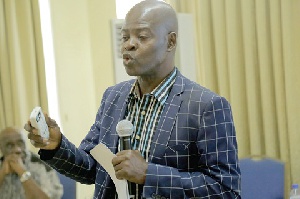Fifteen civil society organisations (CSOs) have called on President Nana Addo Dankwa Akufo-Addo to suspend the Agyapa Royalties agreement–which seeks to leverage the country’s interest in selected mining concessions for development – describing it as ‘elite capture’.
“Ours is a struggle against elite capture of resources that commonly belong to all Ghanaians and we call on every one of us, regardless of our political persuasion, to join hands in safeguarding the national interest,” the group said at a press conference in Accra on Tuesday.
Agyapa Royalties Limited, a Special Purpose Vehicle (SPV) created by the Minerals Income Investment Fund (MIIF), will offer some of the shares held by the fund to investors in order to raise about US$500m when it lists on the Ghana and London stock exchanges before the end of the year.
The group, however, told journalists that the agreement is being pushed through by some faceless persons
Convenor for the group, Dr. Steve Manteaw said government must come clean on who the managers and directors of the company (Agyapa Royalties Limited) are and further raised questions about the processes to select such people; which they fear could be politically exposed persons.
The group, which calls itself Alliance of CSOs Working on Extractives, Anti-Corruption and Good Governance, called on the president to suspend the implementation of the MIIF agreement until all documents relating to the establishment of Agyapa Royalties and its beneficial owners have been disclosed.
The country, Dr. Manteaw warned, could rather be punished by investors should it not rectify the raging controversies surrounding the agreement.
“We are deeply worried that if government proceeded to the market amidst the public outcry and threats of future policy reversal from the major opposition party, Ghana may suffer the undesirable consequence of a rather high premium, as investors may be sensitive to the political risks associated with such investment,” Dr. Manteaw stated.
Way forward
The CSOs called on the President to establish a multi-stakeholder process to review all options available to optimize the mineral royalties in order to secure a risk-free revenue to the state.
“We are always happy to engage as always, to learn, debate and challenge government ways to optimize the mineral royalties if government is willing to activate those democratic channels.
“Gold royalty is the most certain revenues to the state. Even though commodities prices tend to be cyclical, gold has oscillated 20 percent which makes it a more stable than oil,” Dr. Manteaw stated justifying why the deal has to be revised.
Agyapa Agreement
The Deputy Finance Minister Charles Adu Boahen earlier this week told the Business24 that the upfront capital to be raised from listing of Agyapa Royalties Limited on the London Stock Exchange and Ghana Stock Exchange, as well as regular dividends thereafter will be invested in developing the country’s gold resources, building of gold refineries and world-class gold certification institution.
“The funds raised during the listing and future profits will be re-invested in mining and the building of gold refineries and certification companies that will refine and certify gold produced locally and for other countries in the sub-region.
We have been mining for centuries and we don’t have many gold refineries and gold certification companies,” Mr. Adu Boahen said is response to the specific infrastructure projects that funds raised in the IPO and thereafter would be expended on.
Government, under the Minerals Income Investment Fund Act has created a Special Purpose Vehicle (SPV), Agyapa Royalties Limited, to maximise the mineral royalties received by government from mining companies.
In 2019, Ghana’s income from mineral royalties stood at about US$200m, according to Finance Ministry figures.
At a time that the precious mineral is trading at a high of about US$2,000 per ounce, experts have argued that though gold is not a currency, it rivals the dollar as an international reserve asset and has thus benefited from the desire for diversification given the fall in real interest rates.
Click to view details



Business News of Wednesday, 26 August 2020
Source: thebusiness24online.net

















